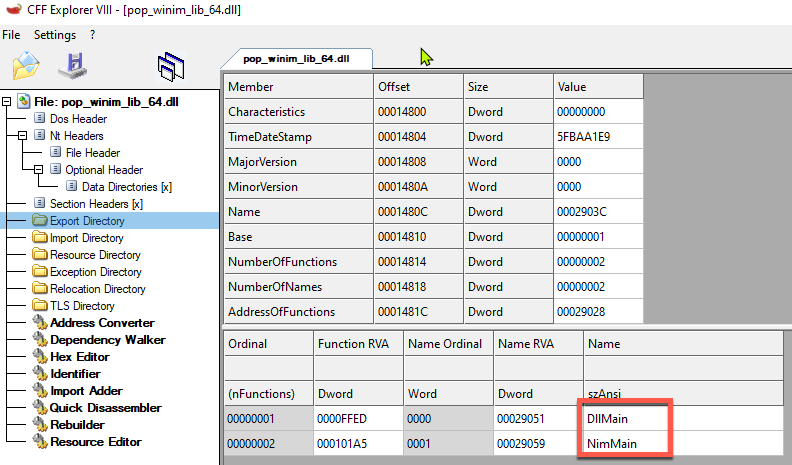My experiments in weaponizing Nim for implant development and general offensive operations.
- OffensiveNim
- Why Nim?
- Examples in this repo
- Compiling the examples
- Cross Compiling
- Interfacing with C/C++
- Creating Windows DLLs with an exported DllMain
- Optimizing executables for size
- Executable size difference with the Winim Library
- Opsec Considirations
- Converting C Code to Nim
- Language Bridges
- Debugging
- Setting up a dev environment
- Pitfalls I found myself falling into
- Interesting Nim Libraries
- Nim for Implant Dev Links
- Compiles directly to C, C++, Objective-C and Javascript.
- Since it doesn't rely on a VM/runtime does not produce what I like to call "T H I C C malwarez" as supposed to other languages (e.g. Golang)
- Python inspired syntax, allows rapid native payload creation & prototyping.
- Has extremely mature FFI (Foreign Function Interface) capabilities.
- Avoids making you actually write in C/C++ and subsequently avoids introducing a lot of security issues into your software.
- Super easy cross compilation to Windows from *nix/MacOS, only requires you to install the
mingwtoolchain and passing a single flag to the nim compiler. - The Nim compiler and the generated executables support all major platforms like Windows, Linux, BSD and macOS. Can even compile to Nintendo switch , IOS & Android. See the cross-compilation section in the Nim compiler usage guide
- You could technically write your implant and c2 backend both in Nim as you can compile your code directly to Javascript. Even has some initial support for WebAssembly's
| File | Description |
|---|---|
pop_bin.nim |
Call MessageBox WinApi without using the Winim library |
pop_winim_bin.nim |
Call MessageBox with the Winim libary |
pop_winim_lib.nim |
Example of creating a Windows DLL with an exported DllMain |
wmiquery_bin.nim |
Queries running processes and installed AVs using using WMI |
shellcode_bin.nim |
Creates a suspended process and injects shellcode with VirtualAllocEx/CreateRemoteThread. Also demonstrates the usage of compile time definitions to detect arch, os etc.. |
passfilter_lib.nim |
Log password changes to a file by (ab)using a password complexity filter |
minidump_bin.nim |
Creates a memory dump of lsass using MiniDumpWriteDump |
http_request_bin.nim |
Demonstrates a couple of ways of making HTTP requests |
execute_sct_bin.nim |
.sct file Execution via GetObject() |
scriptcontrol_bin.nim |
Dynamically execute VBScript and JScript using the MSScriptControl COM object |
excel_com_bin.nim |
Injects shellcode using the Excel COM object and Macros |
keylogger_bin.nim |
Keylogger using SetWindowsHookEx |
amsi_patch_bin.nim |
Patches AMSI out of the current process (Bugged, but compiles. Help appreciated) |
clr_bin.nim |
Hosts the CLR and executes .NET assemblies (WIP, help appreciated) |
amsi_patch_2_bin.nim |
Patches AMSI out of the current process using a different method (WIP, help appreciated) |
excel_4_com_bin.nim |
Injects shellcode using the Excel COM object and Excel 4 Macros (WIP) |
This repository does not provide binaries, you're gonna have to compile them yourself.
This repo was setup to cross-compile the example Nim source files to Windows from *nix/MacOS, however they should work just fine directly compiling them on Windows (Don't think you'll be able to use the Makefile tho which compiles them all in one go).
Install Nim using your systems package manager (for windows use the installer on the official website)
brew install nimapt install nim
(Nim also provides a docker image but don't know how it works when it comes to cross-compiling, need to look into this)
You should now have the nim & nimble commands available, the former is the Nim compiler and the latter is Nim's package manager.
Install the Mingw toolchain needed for cross-compilation to Windows (Not needed if you're compiling on Windows):
- *nix:
apt-get install mingw-w64 - MacOS:
brew install mingw-w64
Finally, install the magnificent Winim library:
nimble install winim
Then cd into the root of this repository and run make.
You should find the binaries and dlls in the bin/ directory
See the cross-compilation section in the Nim compiler usage guide, for a lot more details.
Cross compiling to Windows from MacOs/*nix requires the mingw toolchain, usually a matter of just brew install mingw-w64 or apt install mingw-w64.
You then just have to pass the -d=mingw flag to the nim compiler.
E.g. nim c -d=mingw --app=console --cpu=amd64 source.nim
See the insane FFI section in the Nim manual.
If you're familiar with csharps P/Invoke it's essentially the same concept albeit a looks a tad bit uglier:
Calling MessageBox example
type
HANDLE* = int
HWND* = HANDLE
UINT* = int32
LPCSTR* = cstring
proc MessageBox*(hWnd: HWND, lpText: LPCSTR, lpCaption: LPCSTR, uType: UINT): int32
{.discardable, stdcall, dynlib: "user32", importc: "MessageBoxA".}
MessageBox(0, "Hello, world !", "Nim is Powerful", 0)For any complex Windows API calls use the Winim library, saves an insane amount of time and doesn't add too much to the executable size (see below) depending on how you import it.
Even has COM support!!!
Big thanks to the person who posted this on the Nim forum.
The Nim compiler tries to create a DllMain function for you automatically at compile time whenever you tell it to create a windows DLL, however, it doesn't actually export it for some reason. In order to have an exported DllMain you need to pass --nomain and define a DllMain function yourself with the appropriate pragmas (stdcall, exportc, dynlib).
You need to also call NimMain from your DllMain to initialize Nim's garbage collector. (Very important, otherwise your computer will literally explode).
Example:
import winim/lean
proc NimMain() {.cdecl, importc.}
proc DllMain(hinstDLL: HINSTANCE, fdwReason: DWORD, lpvReserved: LPVOID) : BOOL {.stdcall, exportc, dynlib.} =
NimMain()
if fdwReason == DLL_PROCESS_ATTACH:
MessageBox(0, "Hello, world !", "Nim is Powerful", 0)
return trueTo compile:
nim c -d=mingw --app=lib --nomain --cpu=amd64 mynim.dll
Taken from the Nim's FAQ page
For the biggest size decrease use the following flags -d:danger -d:strip --opt:size
Additionally, I've found you can squeeze a few more bytes out by passing --passc=-flto --passl=-flto to the compiler. Also take a look at the Makefile in this repo.
These flags decrease sizes dramatically: the shellcode injection example goes from 484.3 KB to 46.5 KB when cross-compiled from MacOSX!
Incredibly enough the size difference is pretty negligible. Especially when you apply the size optimizations outlined above.
The two examples pop_bin.nim and pop_winim_bin.nim were created for this purpose.
The former defines the MessageBox WinAPI call manually and the latter uses the Winim library (specifically winim/lean which is only the core SDK, see here), results:
byt3bl33d3r@ecl1ps3 OffensiveNim % ls -lah bin
-rwxr-xr-x 1 byt3bl33d3r 25K Nov 20 18:32 pop_bin_32.exe
-rwxr-xr-x 1 byt3bl33d3r 32K Nov 20 18:32 pop_bin_64.exe
-rwxr-xr-x 1 byt3bl33d3r 26K Nov 20 18:33 pop_winim_bin_32.exe
-rwxr-xr-x 1 byt3bl33d3r 34K Nov 20 18:32 pop_winim_bin_64.exe
If you import the entire Winim library with import winim/com it adds only around ~20ish KB which considering the amount of functionality it abstracts is 100% worth that extra size:
byt3bl33d3r@ecl1ps3 OffensiveNim % ls -lah bin
-rwxr-xr-x 1 byt3bl33d3r 42K Nov 20 19:20 pop_winim_bin_32.exe
-rwxr-xr-x 1 byt3bl33d3r 53K Nov 20 19:20 pop_winim_bin_64.exe
Because of how Nim resolves DLLs dynamically using LoadLibrary using it's FFI none of your external imported functions will actually show up in the executables static imports (see this blog post for more on this):
If you compile Nim source to a DLL, seems like you'll always have an exported NimMain, no matter if you specify your own DllMain or not (??). This could potentially be used as a signature, don't know how many shops are actually using Nim in their development stack. Definitely stands out.
https://github.com/nim-lang/c2nim
Used it to translate a bunch of small C snippets, haven't tried anything major.
-
Python integration https://github.com/yglukhov/nimpy
- This is actually super interesting, especially this part. With some modification could this load the PythonxXX.dll from memory?
-
Jave VM integration: https://github.com/yglukhov/jnim
Use the repr() function in combination with echo, supports almost all (??) data types, even structs!
VSCode has a Nim extension which works pretty well. This also seems to be the only option at this point.
-
When calling winapi's with Winim and trying to pass a null value, make sure you pass the
NULLvalue (defined within the Winim library) as supposed Nim's builtinnilvalue. (Ugh) -
To get the OS handle to the created file after calling
open()on Windows, you need to callf.getOsFileHandle()notf.getFileHandle()cause reasons. -
The Nim compiler does accept arguments in the form
-a=valueor--arg=valueeven tho if you look at the usage it only has arguments passed as-a:valueor--arg:value. (Important for Makefiles) -
When defining a byte array, you also need to indicate at least in the first value that it's a byte array, bit weird but ok (https://forum.nim-lang.org/t/4322)
Byte array in C#:
byte[] buf = new byte[5] {0xfc,0x48,0x81,0xe4,0xf0,0xff}Byte array in Nim:
var buf: array[5, byte] = [byte 0xfc,0x48,0x81,0xe4,0xf0,0xff]- https://github.com/dom96/jester
- https://github.com/pragmagic/karax
- https://github.com/Niminem/Neel
- https://github.com/status-im/nim-libp2p
- https://github.com/PMunch/libkeepass
- https://github.com/def-/nim-syscall
- https://github.com/tulayang/asyncdocker
- https://github.com/treeform/ws
- https://github.com/guzba/zippy
- https://github.com/rockcavera/nim-iputils
- https://github.com/FedericoCeratto/nim-socks5
- https://github.com/CORDEA/backoff
- https://github.com/treeform/steganography
- https://github.com/miere43/nim-registry
- https://github.com/status-im/nim-daemon


